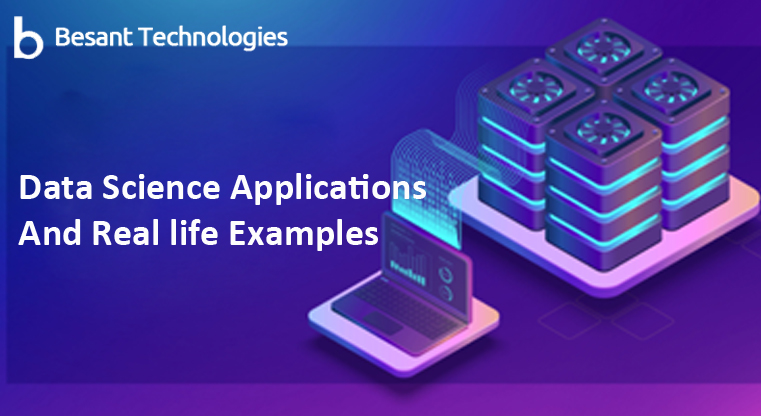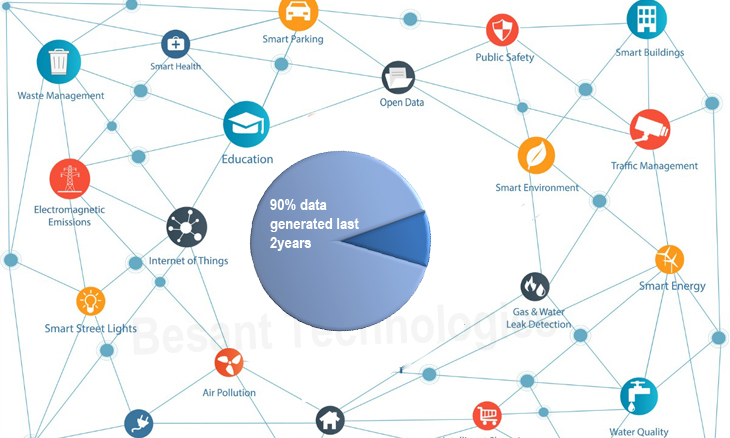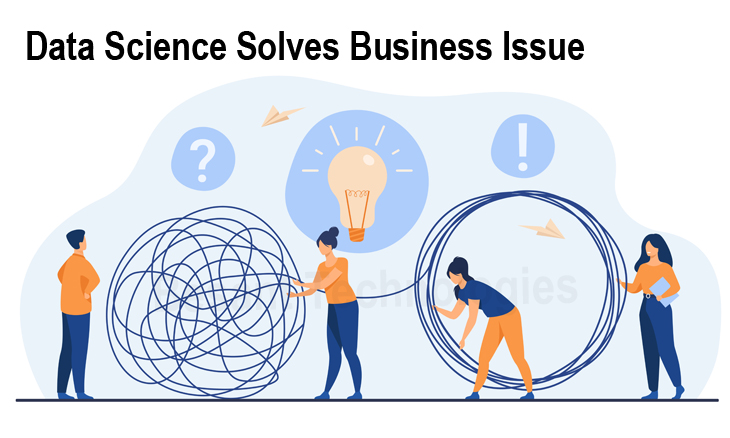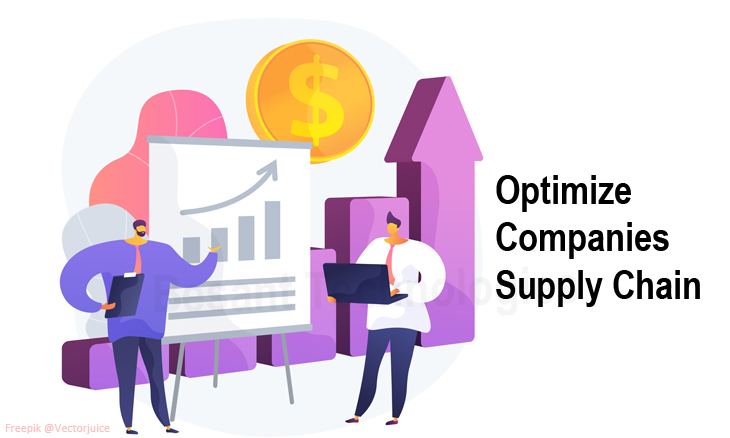
Data Science Applications and Real life Examples
Data is something you use all the time. In today’s world, data is everything. But data, in and of itself, may not be useful. It’s the meaningful insights extracted from data that help government organizations, research centers, businesses and other entities make informed decisions. The world of data is huge! 90 percent of the data in the world has been generated over the last two years. This might sound a little exaggerated, but it’s pure truth. With such massive amounts of data being produced every second, the importance of data science in the present-day scenario can’t be overemphasized. Data science is the field of study that evolved from the necessity to deal with this ever-growing nature of data.

Dealing with the huge pool of data that we have today is no joke. But that’s what data science and the people associated with it, known as data scientists, do— they make data meaningful for various entities like businesses. Data science is a part of our daily lives and lives with us every second. It’s data science, for instance, that suggests Google results when you enter a query. It’s data science that suggests friends to you on your social networking platforms. And it’s data science that suggests what you might like to watch on Netflix. Data science also helps job sites recommend relevant jobs to you.
Data science has significant implications for entrepreneurs here is what data science means to businesses
It doesn’t matter if your business is selling clothes or producing sports accessories, data is vital for you. So, companies that want to remain competitive, grow and scale their businesses should invest in Data Science resources and in machine learning projects. It’s high time that businesses stand alert and prepared for this new reality. Data Science helps companies manipulate data and solve business issues based on results, not guesses.
Businesses can benefit immensely by leveraging the power of data processing for the extraction of useful information and drawing meaningful conclusions. This helps in strategic planning. So, if you are still subverting where you can use Data Science and machine learning, then the answer is—Everywhere! Every industry and field can use data science to detect patterns in data and benefit from the findings. It’s a fact that a company that wants to be competitive on the market will have to digitize their organization sooner or later as entrepreneurs will be able to reap the greatest benefits from digitization. And once digitized, they will not just produce data but also use it more aggressively.
It’s worth pointing out here that Data science allows businesses to make better decisions. How? Data-driven decisions are not based on opinions, they are rather based on stats. Human instinct may be reliable, but it can’t always be accurate. This is not a problem with data science or machine learning systems. They are free from both emotions and rush. Besides, data science and machine-learning systems are highly efficient— they can analyze millions of bytes worth of data in the matter of a few seconds. So, they are time-saving as well.

Data science is also a great tool for increasing sales. Machine learning systems are able to analyze data and make market comparisons. From that, they can make recommendations about how, when and where your product/service will be most successful. Data science can also help you improve accuracy with regards to reaching your target market. Although data science may cause certain changes in the operations of your company, you are likely to see new and unexpected opportunities by using data-based solutions.
Let’s now look at some real life data science applications with examples in a variety of areas.
We will see how data science can be used in manufacturing, banking, logistics, retail, marketing, and sales.
Forecasting demands in the manufacturing sector
Manufacturing is the first example we have. Data science is used by many manufacturers to forecast product demand. Data science helps companies optimize their supply chains and deliver orders without the risk of under- or over-ordering. Data science can help you save a lot, especially when it comes to supply chain optimization. This reduces the chance that your products will not be delivered on time and stocked. In optimizing supply chains, data science considers many factors including weather, shipping costs, material availability, market scarcity etc.

Companies can also use data analysis to analyze customers’ needs and behaviors. This analysis is crucial for understanding which products are most in demand. This in turn leads to an increase in sales. With the right forecasts and learned conclusions, companies can optimize their resources and control their expenditures. Essentially, data science can be very useful in a manufacturing business, especially when it comes to forecasting demand, optimizing supply chains, and minimizing costs.
Optimizing logistics supply chain
Optimizing the supply chain is also important in the logistics industry. Popular logistics companies ship millions of packages each day. So, it’s clear that data is a major problem in the logistics industry too. Starting from customer data, GPS data and the types and number of items— millions of pieces of data are processed every day. This is where data science comes in! There are dedicated optimizing algorithms that can reduce delivery times and determine the best route for vehicles, reducing operating costs by speeding things up.
By combining historical data and information about consumer profiles and macroeconomic indicators, logistics companies can predict demand for their services with high accuracy. Data science can also be used to optimize the warehouse sector. Data science can help you save time, space, and money, as well as reduce errors when managing your warehouse. Data science algorithms constantly seek out the most efficient ways to store products and manage a warehouse.
Customer analytics in the retail sector
Receipts are the best way to get the most important information for a retailer’s business. The receipts contain the most valuable information, after all. The quick processing of millions upon millions of receipts and the conclusions drawn from this data help to organize products correctly in shops and to categorize goods appropriately. This might result in higher sales and better customer service. The hundreds of millions of receipts that are issued each day result in huge amounts of data which is impossible to understand for any one person or team. Data science is the only way to handle this kind of data.
Data science is a boon to the e-commerce industry Data science apps are also able to manage discounts and promotions in real time. This could be a great way to sell out existing products and create interest in new products. Data science can analyze the entire social media network to predict what products are most in demand in the near future, and then promote the exact same products to that market.
Data science can also analyze every customer’s online shopping cart and make recommendations based on their preferences. You can also see the results in real time! This is known as upselling, which means you offer more expensive products than the one the customer chooses. Cross-selling refers to adding an additional product or service to the customer’s cart. Without data science, both of these techniques would be impossible. This is one of the most important uses of data science in e-commerce.
Studying customer behavior for product recommendations
It is extremely valuable for marketers to understand user behavior on their websites. This information can be used to determine the customer’s tastes and preferences, their knowledge, needs, and what they are interested in.
The Customer Journey analysis can help you create better recommendation systems that are more accurate and which indicate what products customers are most interested in buying. These systems allow stores to become closer to customers and drive business. Google Analytics, which is essentially a data science application, can be used to help you with this. It provides a clear picture of your customers’ online behavior and shows you what to do to increase their interest in your products or offers.
Estimating risks associated with granting a loan with the help of credit scoring
Next in the list is the banking sector. NPL, or Non-Performing Loans, is the sector’s biggest problem. These loans are those that have not been paid in full for at least 90 calendar days. Loans that aren’t settled within this time period become NPL, which means “endangered”. This is a serious problem. According to data, 3.74% of all loans worldwide are non-performing loans.
Every bank company tries to avoid this problem. Data science can play a significant role in helping to reduce that number. Data science algorithms can use customer banking history to estimate creditworthiness of loan debtors and predict which loans will become NPLs in the future. Risk management is one of the many uses of data science within the banking industry. Banks are already using machine learning algorithms for past spending pattern analysis.
Data science and machine learning applications can analyze the impact of financial trends and market conditions on consumers’ behavior by drawing on their historical data. The key to success in the financial industry is to be able to make credit decisions based on customers’ banking transactions. It is important that financial institutions can detect fraudulent transactions and send them to a deeper analysis. Data science and medicine learning algorithms detect illegal transactions that are difficult for employees to spot manually.
Data science is also able to predict how market changes will impact customer reactions and decision making.
Understanding sales analytics
Sales is the core of every company. But it is a difficult job to do for sales representatives. There are hundreds of calls, meetings, follow ups, offers, and presentations. So, sales reps are always in a hurry. Data science can help them too. Data science algorithms can be used by sales reps to recommend the best products or services to potential clients. Such algorithms can also indicate the best discount. This saves sales reps a lot of time. This time could be used to arrange new leads. Even better, it can all be done live, such as when the representative is talking to the client over the phone. This is data science – fast, accurate, and irreplaceable. Data science can also help sales reps identify which prospects are most likely to close the deal. Or suggest the actions that will increase the conversion rate. Evidently, there are many benefits.
Above, we have examined some common real life examples of data science. However, almost all businesses are benefiting from data in some way or the other. Starting from predicting trends to learning about customers, data science helps companies achieve a lot. Data science facilitates making decisions that will have a significant impact on your company’s growth. You are able to keep up with the changing market dynamics and focus on leads that have the greatest chance of becoming customers.
There are hundreds of other data science applications. This article barely scratches the surface. Data science is simply so much more!
Interested to implement data science in your business learn Data Science through Online @Besant Technologies. Preferring a classroom training learn at your location Data Science Training in Chennai, Data Science Training in Bangalore.

